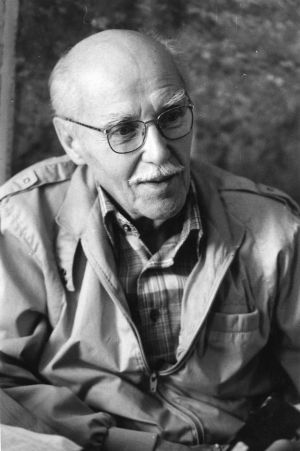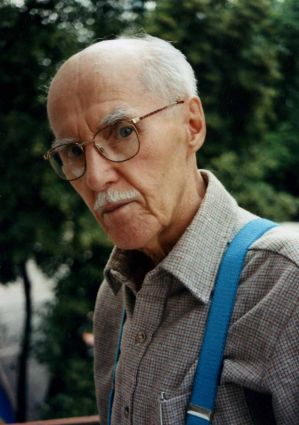KOLASKY, JOHN WASYL (b. October 5, 1915, in Canada – d. October 21, 1997, in Kyiv).
Canadian communist, later a dissident.
The Kolasky family was from Bukovyna. His father arrived in Canada in 1912, his mother in 1913. In 1916, his parents bought a farm where they worked in the summer and in a mine during the winter. Life was hard. Furthermore, his father was crippled in the mine and died a few years later. The family sold the farm and settled in the mining town of Timmins. From the age of 16, Kolasky wandered across Canada in search of work. It was a period of economic crisis, during which the communist movement spread. Among Ukrainians, there was talk that there was no unemployment in the USSR, that everyone was working and building a society without the exploitation of man by man. Kolasky became a sincere enthusiast of communist ideas and joined the Communist Party.
In 1944, Kolasky came to Saskatoon, earning a Bachelor of Arts in history and later a Master's degree. He taught for 10 years and became a prominent figure in the Communist Party of Canada.
In 1963, the party sent Kolasky to study at the Higher Party School of the Central Committee of the Communist Party of Ukraine. It was there that the communist “paradise” was revealed to him in all its unattractiveness, with its lies, fear, poverty, mismanagement, and backwardness. He was particularly struck by the total Russification of Ukraine. He became convinced that this was not a union of free peoples but a Russian empire. Kolasky began to collect information and documents on this topic and sent them to Canada, sealed inside book covers. He did this through the “Society for Cultural Relations with Ukrainians Abroad,” a thoroughly KGB-controlled organization. The KGB intercepted two documents about the Russification of secondary technical schools and arrested Kolasky in July 1965. He was suspected because he had become acquainted with Borys ANTONENKO-DAVYDOVYCH, Ivan and Nadiya SVITLYCHNY, Ivan DZIUBA, Taras and Zynoviia Franko, Alla HORSKA, journalist Vitaliy SHEVCHENKO, and other Ukrainian patriots.
Kolasky was held under arrest and interrogated for several weeks. He said nothing of substance. To avoid an international scandal, Kolasky was, as the newspaper “Literaturna Ukraina” wrote at the time, “expelled from the USSR.” On the way to the airport, a KGB agent told him, “Ivan Vasylyovych, take a look at the Dnipro, because you will never see it again!” But the KGB agent was mistaken.
In Canada, Kolasky found himself caught between two fires: the communists considered him a traitor, while the nationalists saw him as a trained KGB agent sent to undermine their camp. However, this did not last long. In March 1968, his book “Education in Soviet Ukraine” was published (the Ukrainian edition, “Osvita v Radianskii Ukraini,” appeared in 1970). The work became a sensation. For the first time, it used documents that had never been seen outside the USSR to reveal the essence of Soviet national policy. The book received countless reviews and responses. The communists in Canada and the USA were furious, and discord began in the ranks of these parties, which were sustained by subsidies from the USSR. Many members left, and the parties began to decline catastrophically.
In 1970, Kolasky’s book “Two Years in Soviet Ukraine” (264 pp.) was published in Toronto; in 1972, “Look, Comrade, the People Are Laughing” (164 pp.; Australian version, 1985, “Propaganda’s Harvest,” 146 pp.); in 1979, “The Shattered Illusion: The History of Ukrainian Pro-Communist Organizations in Canada” (263 pp.); and in 1990, “Partners in Tyranny: The Nazi-Soviet Non-Aggression Pact of August 23, 1939” (158 pp.). In these works, the author further substantiated his position, exposing the evil of the Moscow empire and communism.
Kolasky gave hundreds of public speeches in Canada and the USA. In addition, he translated articles by V. MOROZ into English and published them in 1974 as the book “Report from the Beria Reserve”; in 1988, he published an English collection titled “Ukraine and the Subjugated Nations: Their Struggle for National Freedom. Selected Articles and Speeches by Former Prime Minister of Ukraine Yaroslav Stetsko” (New York, 648 pp.); and also the book “Prophets and Proletarians: Documents on the Rise and Fall of Ukrainian Communism in Canada” (Edmonton, 1990, with over 400 documents).
With the advent of perestroika, Kolasky assisted national-democratic forces in Ukraine, especially the Ukrainian Helsinki Union (UHU) and later the Ukrainian Republican Party (URP), by collecting office equipment for them in the diaspora and organizing humanitarian aid.
Kolasky returned to Ukraine on August 21, 1991, during the GKChP putsch, joined the URP, and served as an advisor to its Chairman. In 1993, he sought Ukrainian citizenship, but the authorities did not respond. Kolasky spent several months in Ukraine each year, traveling to almost all oblasts with his persuasive anti-communist speeches.
He lived in the village of Khotiv, Kyiv-Sviatoshyn raion, with L. LUKIANENKO. He is buried in Khotiv.
Bibliography:
I.
Kolasky, Ivan. “Yakby ya buv hromadianynom Ukrainy” [If I Were a Citizen of Ukraine]. Samostiina Ukraina, no. 13, September 1991.
Kolasky, John. Partners in Tyranny: The Non-Aggression Pact of August 23, 1939. Translated from English by Feliks Redko. Kyiv, 2006. 118 pp.
ІІ.
Lukianenko, Levko. “Ukraina vidmovyla yomu trychi... Ale vse zhyttia vin buv yii hromadianynom” [Ukraine Refused Him Three Times... But He Was Its Citizen His Entire Life]. Samostiina Ukraina, no. 34-35 (298-299), October 1998.
Lukianenko, Levko. Kolaska Ivan Vasylyovych. Kyiv: URP, 1998. 52 pp.
“Ivan Vasylyovych Kolaska (obituary).” Narodna gazeta, no. 44 (324), November 1997.
International Biographical Dictionary of Dissidents in the Countries of Central and Eastern Europe and the former USSR. Vol. 1. Ukraine. Part 1. Kharkiv: Kharkiv Human Rights Protection Group; “Prava Liudyny,” 2006, pp. 314–316. https://museum.khpg.org/1184397817
Rukh oporu v Ukraini: 1960 – 1990. Entsyklopedychnyi dovidnyk [The Resistance Movement in Ukraine: 1960–1990. An Encyclopedic Guide]. Foreword by Osyp Zinkevych and Oles Obertas. Kyiv: Smoloskyp, 2010, pp. 304–305; 2nd ed.: 2012, pp. 339–340.
.
Vasyl Ovsiyenko, Kharkiv Human Rights Protection Group. July 19, 2006. Based on the brochure by L. Lukianenko. Last read August 9, 2016.

